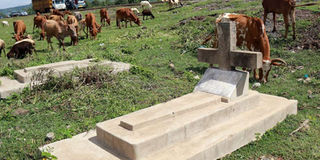2017: The year when public healthcare died

If ever there was a time to write an obituary for the public health system in Kenya, the year 2017 would be it. PHOTO| FILE
If ever there was a time to write an obituary for the public health system in Kenya, the year 2017 would be it. The tombstone would read: Herein lies our public health system, born in 1963, died in 2017 after a lifetime of sickly struggle.
The public health system has been ailing for several years, swinging between “sick but stable” to hanging on a thread in the intensive care unit.
There have been moments when we had rays of hope, hope that the situation could be finally be salvaged, followed by swift disappointment yet again.
The last four years have seen public healthcare in a state of palliative care, mostly attributed to devolution of healthcare, but the deep-seated problem has been a failed policy implementation framework.
In 2013, counties came alive, with a whole new governance structure, but the transition to a devolved system has been anything but smooth. There have been turf wars between the counties and national government and the level of mistrust and absence of positive intergovernmental relations is severely undermining service provision.
FINAL NAIL IN THE COFFIN
The Ministry of Health has been hardest hit. From the outset, health workers were up in arms against the hurried and unplanned devolution of healthcare without appropriate structures. They went on a nationwide strike in 2013 that should have served as a wake-up call to all involved to rise up and take action. Unfortunately, they were ignored and matters went from bad to worse.
Subsequent years saw multiple county-based strikes take place at the expense of the poor patient. Counties had ridiculous reactions to the industrial action that was taking place while overall public health was rapidly being crippled.
The year 2017 was the final nail in the coffin. In December 2016, doctors went on strike for 100 days, closing down every public health facility in Kenya. For 100 days, the taxpayers, whose taxes are meant to cater for their health, were denied a basic right. As patients died, the health custodians played hardball and ignored the silent genocide they had set up.
The strike eventually ended but the respite was short. A few weeks later, nurses went on strike, paralysing every health facility in Kenya. Despite Kenyatta National Hospital and Moi Teaching and Referral Hospital trying to hold together a semblance of service delivery, the truth is that the two institutions are so overwhelmed, they are crossing into the realm of doing more harm than good.
The nurses’ strike has crossed the 100-day mark. For 200 out of 365 days in 2017, we have not had a working public health system in place. The sector finally drew its last breath and gave up the ghost. We are no longer in ICU hanging by a thread. The public health sector is dead and the obituary published. All this, under the watchful eye of well-paid custodians without a conscience.
The much touted free maternity care is in the bin as maternity wards across the country are closed. Shifting the burden to private and faith-based health facilities is escapism. How many of these exist in Taita Taveta, Marsabit, Isiolo, West Pokot, Mandera and Tana River? As mothers and newborns die like flies and we refuse to acknowledge the statistics, it begs the question, are they children of a lesser God?
FACING CONSEQUENCES OF 'SUPREMACY WARS'
How much longer are young men going to die of trauma-related injuries? How many babies are missing life-saving vaccines and succumbing to pneumonia because there is no oxygen? How many of our patients living with HIV are missing their life-saving medications? How many diabetics are succumbing to diabetic coma? How many strokes and heart attacks are claiming hypertensive patients as clinics remain closed?
As supremacy wars between the counties and the Ministry of Health rage on, let me remind the custodians of public healthcare that they cannot escape blame.
For those counties that refuse to invest in their facilities, human resource, and their operations and maintenance, some day that sleepy populace that voted for you shall be liberated from ignorance and the tables shall turn. It may take longer than necessary but as sure as the sun sets, it shall happen.
As for the national level custodians, let it be known that abdicating your responsibility is not acceptable. Policy implementation falls squarely in your docket. I would like to see just one policy that the Ministry of Health has bothered to implement that touches on devolved healthcare services. One that does not involve procurement.
Let’s start simple, how about implementation of the staffing norms? Just this once, could the Ministry please rise up and give direction to counties on what the requisite numbers of staff are and call for their implementation in all counties?
How about the hoax that NHIF is about to turn into? How do we explain how a patient is allocated a facility that does not have the drugs required by the NHIF beneficiary, forcing them to pay out of pocket anyway? Why won’t the facility have the drugs?
Alternatively, why is a prescription not referred to another facility the way expensive radiological investigations are referred? Surely, a patient can be sent to a private facility for a CT scan costing Sh6,000 but won’t be sent to a private pharmacy for anti-hypertensive drugs that cost Sh1,000? Where is the policy custodian?
While the public healthcare system is at a standstill because of politics, be warned that cancers are progressing to incurable stages; patients on dialysis are dying for lack of access to dialysis centres that are closed; cholera is doing a happy dance as it continues to cause havoc unchecked, and our maternity ambulances are rusting away in hospital parking bays because the midwives are on strike!



